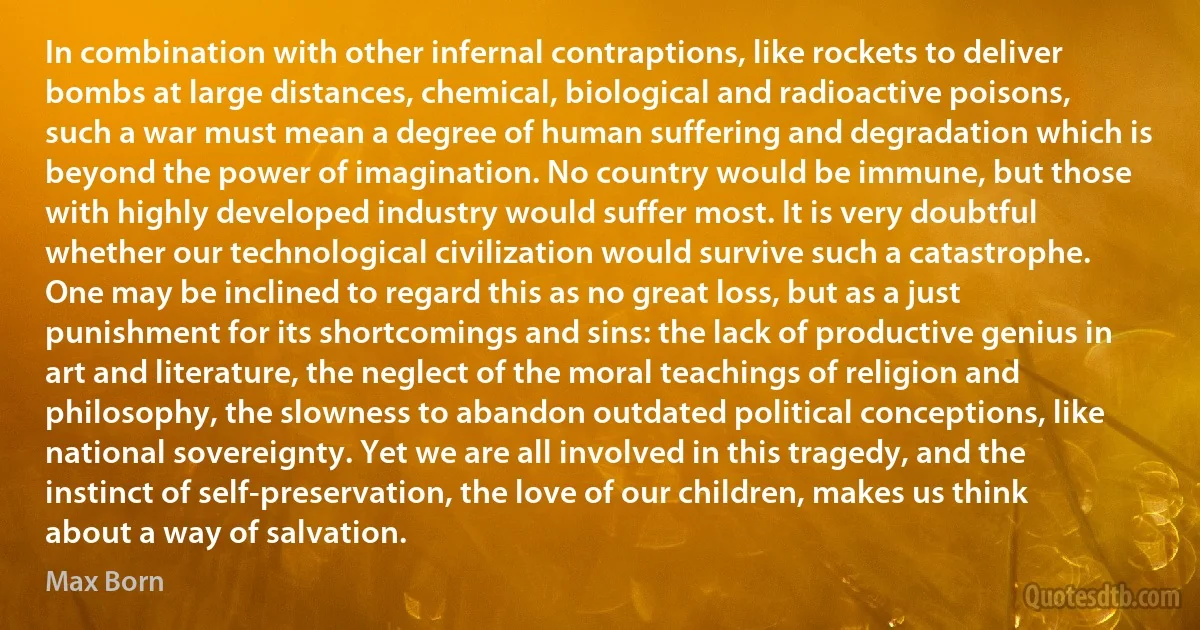
In combination with other infernal contraptions, like rockets to deliver bombs at large distances, chemical, biological and radioactive poisons, such a war must mean a degree of human suffering and degradation which is beyond the power of imagination. No country would be immune, but those with highly developed industry would suffer most. It is very doubtful whether our technological civilization would survive such a catastrophe. One may be inclined to regard this as no great loss, but as a just punishment for its shortcomings and sins: the lack of productive genius in art and literature, the neglect of the moral teachings of religion and philosophy, the slowness to abandon outdated political conceptions, like national sovereignty. Yet we are all involved in this tragedy, and the instinct of self-preservation, the love of our children, makes us think about a way of salvation.
Max BornRelated topics
art beyond biological catastrophe chemical children country degradation degree genius great human industry infernal lack large loss love mean national neglect power punishment religion sovereignty suffering think war way yet radioactiveRelated quotes
Their system of unorganized and antagonistic industries was as absurd economically as it was morally abominable. Selfishness was their only science, and in industrial production selfishness is suicide. Competition, which is the instinct of selfishness, is another word for dissipation of energy, while combination is the secret of efficient production; and not till the idea of increasing the individual hoard gives place to the idea of increasing the common stock can industrial combination be realized, and the acquisition of wealth really begin. Even if the principle of share and share alike for all men were not the only humane and rational basis for a society, we should still enforce it as economically expedient, seeing that until the disintegrating influence of self-seeking is suppressed no true concert of industry is possible.

Edward Bellamy
Development means a capacity for self-sustaining growth. It means that an economy must register advances which in turn will promote further progress. The loss of industry and skill in Africa was extremely small, if we measure it from the viewpoint of modern scientific achievements or even by standards of England in the late eighteenth century. However, it must be borne in mind that to be held back at one stage means that it is impossible to go on to a further stage. When a person was forced to leave school after only two years of primary school education, it is no reflection on him that he is academically and intellectually less developed than someone who had the opportunity to be schooled right through to university level. What Africa experienced in the early centuries of trade was precisely a loss of development opportunity, and this is of the greatest importance.

Walter Rodney
The philosophy of nature must not be unduly terrestrial; for it, the earth is merely one of the smaller planets of one of the smaller stars of the Milky Way. It would be ridiculous to warp the philosophy of nature in order to bring out results that are pleasing to the tiny parasites of this insignificant planet. Vitalism as a philosophy, and evolutionism, show, in this respect, a lack of sense of proportion and logical relevance. They regard the facts of life, which are personally interesting to us, as having a cosmic significance, not a significance confined to the earth's surface. Optimism and pessimism, as cosmic philosophies, show the same naive humanism; the great world, so far as we know it from the philosophy of nature, is neither good nor bad, and is not concerned to make us happy or unhappy. All such philosophies spring from self-importance and are best corrected by a little astronomy.

Bertrand Russell
Is not the reason of the confidence of the positive, critical, experimental scientists, and of the reverent attitude of the crowd towards their doctrines, still the same? At first it seems strange how the theory of evolution (which, like the redemption in theology, serves the majority as a popular expression of the whole new creed) can justify people in their injustice, and it seems as if the scientific theory dealt only with facts and did nothing but observe facts. But that only seems so. It seemed just the same in the case of theological doctrine: theology, it seemed, was only occupied with dogmas and had no relation to people's lives, and it seemed the same with regard to philosophy, which appeared to be occupied solely with transcendental reasonings. But that only seemed so. It was just the same with the Hegelian doctrine on a large scale and with the particular case of the Malthusian teaching.

Leo Tolstoy
The chief distinction in the intellectual powers of the two sexes is shewn by man attaining to a higher eminence, in whatever he takes up, than woman can attain - whether requiring deep thought, reason, or imagination, or merely the use of the senses and hands. If two lists were made of the most eminent men and women in poetry, painting, sculpture, music, - comprising composition and performance, history, science, and philosophy, with half-a-dozen names under each subject, the two lists would not bear comparison. We may also infer, from the law of the deviation of averages, so well illustrated by Mr. Galton, in his work on 'Hereditary Genius,' that if men are capable of decided eminence over women in many subjects, the average standard of mental power in man must be above that of woman. ... Thus man has ultimately become superior to woman.

Charles Darwin
